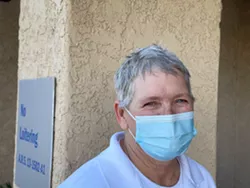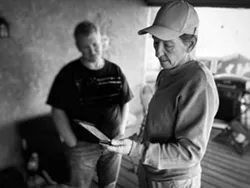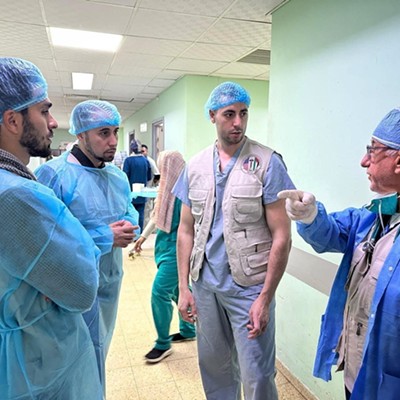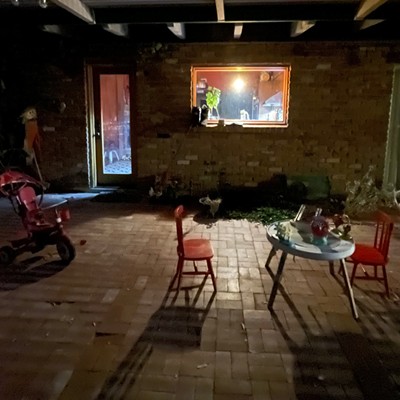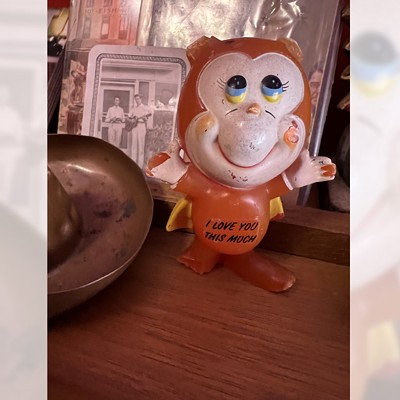She is standing in front of the blue and silver Bank of America, the word "security" emblazoned in large block letters on the back of her clean, white shirt. She cuts a foreboding presence in her uniform, a palpable aura of protection. She is middle-aged, solid, armed, wraparound mirror shades ornamented with a Dallas Cowboys star on either side. She has never pulled her weapon on the job. No bank robberies or serious conflicts in her 14 years working for a security company.
Pulls her mask down, discretely spits a bit of chew into a water bottle she keeps pocketed in her security pants below her gun, lifts the mask back into place and says, "If I can turn kindness, I will."
A long moment passes, the chilled breeze carries a mix of car fumes and customer perfumes, a motorcycle judders by at insane volume, and the sun is out.
From this parking lot, Bett Helseth's walkabout post, she sees the fixed grid of Campbell Avenue and its ad hoc trimmings, the utilitarian discomfort of the Bank of America lot, the Albertson's grocery and blocky plaza across the street, the arched '70s- Shaffer dry cleaners sign framed by the northern end of the snow-capped Catalina Mountains, its light-scattered blue. The mess of electrical wires from multiple directions collected at the corner pole. The eternal traffic.
In the time it takes to blink twice, her world takes weighty pitch: The exact gait of a war vet trudging up the avenue whose back is bent under the weight of god knows what, the grace of an African Islamic woman in a colorful hijab whose flowing blue and turquoise dress shifts color in the breeze as she falls in the bank's outdoor line. In front of her, the precise tribal leg etchings of the man-bunned white dude in long black shorts playing air drums to discernable earbud beats. The gent in the tailored blue suit and polished shoes, his air of punch-clock hurry. Helseth says, "See, it's a beautiful day."
A guy pulls up in his work truck and steps out. Unshaven, slender, all blue-collar and workday tired, outdoor-dirty mask and jeans. Helseth informs him to wait, until a customer exits the bank. His impatience is exposed, but she stays on him until he laughs. When she opens the bank door for him, she adds, "Here you go, sir."
Turn kindness. Yes, she does. This is a woman who arrives at work 45 minutes early to work nearly every day to ensure bank-employee safety as they enter. "It's how you approach people," Helseth says. "'Have a good day,' that's all it takes."
Maybe her outward benevolence reveals a deeper flaw, some twist beneath her armor, or a sense that some torment had once consumed her and she escaped it, arriving at the other end opening doors for banking customers with a considerate, almost subservient deportment. When she talks her own life, her voice is free of inflection in smart intuitive quips, when she talks with others of their lives, there are lilts and laughs.
Helseth's brother died this past year, his jeep flipped and exploded. They had just put their mother into a home, dementia. Her younger sister died eight years ago on Christmas day, a freak blood clot, and her dad died a few weeks later, complications from alcoholism, in a VA hospital. Minutes pass, she stops to perform a COVID-safety count on the number of customers inside the bank and the several waiting to enter. She returns, says matter-of-factly, "it was all devastating, knowing I'm the last person standing in my family. Especially at Christmastime."
One woman, Mary Heist, appears, greets Helseth as an old buddy. "I've been bugging her for months," Heist laughs. "Look, she's what you would call an icon, an historical figure here." The two exchange laughs, even talk gun-cleaning. Others approach Helseth today, some tell of chocolates and cookies they gift her at Christmas.
Too, grim-faced COVID deniers forever open to hateful atmospheres have insulted her after refusing a request to mask up. "'Bitch, cunt, motherfucker,' I've heard it all," she says. "Make people stand in line, some get mad. It's not my fault, it's not the bank's fault. With COVID I've embraced masks, distancing. So I don't take it to heart. But you know what? I smile and say, 'Have a nice day.'"
Should the bank get robbed, Helseth would follow work protocols, which she declines to specify. "But," she says, "It's always in the back of my head, somebody carrying a concealed weapon. Look, I'm a deterrent factor."
What emerges here is a limitless patience to Helseth and her work, speaks to a personal acceptance and informs her outward contentedness, like she is finally living in the version of her future self. Hers is a rather extraordinary inner peace. "I really don't have aspirations," she says. "I spend lots of time with my dog Paige. I rescued her and she rescued me."
After several hours out here, the afternoon begins it slow slog, the local orbits and jarring distortion of traffic begin to soothe. She doesn't get tired, more lulled by the work and scenery, while never exhausting her attentive air. Helseth offers to the folks in line, "Who all is looking forward to the weekend. I know I am."
The old Latina fronting the six-person queue, laughs, shakes her head, says, "At my age, there is nothing to go out and do this weekend."
She compliments a man for his hat, turns to me and begins talking her upbringing: Dad was a military man, a mechanic, and a Nam vet with a weakness for booze. He was strict. ("It was 'yes ma'am, no sir' and I thank him for it.") About how he taught good work ethics, "The only good thing he taught me." The family moved around, the states, overseas. She graduated from high school in Suffolk, England, and the family soon moved from the UK to Phoenix, and she moved back and forth to Tucson. She married a military man at 19, had a son. The marriage ended after the three moved to England (hubby was stationed there). She left with her son and returned to Tucson. Husband returned, they divorced. She gave up her son so the boy could have a better life in Delaware.
"There were a lot of hard decisions," she says with enough resignation and sadness to about snap her work poise. "I had to sacrifice so my son could have a better life. I didn't want to move back in with my parents to raise my son, him growing up around an alcoholic, me bagging groceries. I did it for him, he had a military dad and home stability, all the things a child needs." She misses her son (and grandson) terribly. They don't talk much now, but she is working on it.
She first bagged groceries in England. In Phoenix, worked years at a Mcdonald's. ("You don't know how hard people work at fast-food places.") To meliorate her life she earned an associate's degree in auto mechanics, taking night classes while working fulltime as a delivery person for a transmission company. She was passed over in the job market for men. ("It was sexist, yes, but try to prove that.") Left a potential mechanic life behind, disillusioned. She has spent a total of six months unemployed since she was 16 years old. "My options were to play sports or have money."
She began work with the Arizona Department of Corrections (ADC) working the Lewis prison in Buckeye, Arizona. Left that and logged three years with the Maricopa County Sheriff's department. Six months headhunted by the security company she works for now, which saw her everywhere from a Tolleson, Arizona slaughterhouse ("A cow-disassembly plant, it wasn't pretty") to security for hurricane victims in the Virgin Islands.
"Security is underrated, how it's portrayed in TV shows. I put in my time. I'm blessed I have this job. I see different people every day, all walks of life. Stay in one place long enough you see things change."
She arrived back in Tucson from Phoenix for good in 2013. "I'm going to retire here," says the fan of old-school country music. "I like it here. Tucson is big, but it is small. It keeps its core concept."
There is also a remarkable love story humming beneath the surface.
* * *
It is a trailer park in the old-school sense on Tucson's far southeast side; a guard gate whose attendant takes your license plate number, golf-carts slotted outside doors, well-kept grounds and cared-for plants. Mostly old folks receding from external-world forces.
"It's quiet here," Helseth says at her home entrance, looking unrecognizable out of uniform in a dark blue T-shirt and faded jeans. "People 55-and-over don't party."
Hers is a small four-room place with covered parking, enclosed patio and outdoor shed. Inside it is comforting yet foreign, like visiting a live-alone aunt in another state. The tidy domesticity and smell of clean laundry, the muted colors and diffuse but melancholy daylight, the bowling trophy and tiny arched candle arrangement, a pair of plush lay-about couches in the main room. Paige's barks recede quickly and the least anxious Chihuahua on earth relaxes atop a doggie bed outfitted with a Dallas Cowboys blanket.
"Mom knew the names of all the Cowboys' players," Helseth says, "It sort of grew on me."
A framed childhood picture of Helseth and her two siblings preserves a sadder significance, she nods to it, says, "My brother was my protector, my sister was my best friend." A large hanging photo of that younger deceased sister, Donna, is a living-room centerpiece, a flower affixed to the glass. "That's my hero right there," she adds. "She was more grown than I was. She saved my life." Helseth explains that when she was wrestling with life-threatening personal demons, it was her sister who intervened, and so she is eternally grateful.
With Helseth at home today is Dotty Huntley, hardy in matching tan jacket, cap and trousers, black cowboy boots, husky voice and lover of guns. They eschew the word "partners" or "couple," preferring instead comforting actions to substitute: "We complement one another's lives." Whatever they say it is difficult not to miss a love.
The two reconnected months ago on the Plenty of Fish lesbian dating app, unaware they'd had a short relationship 27 years ago, and were shocked when they discovered. "We did not recognize one another," Huntley laughs, taking a seat on the couch, leaning into Helseth. "She didn't have gray hair then, I didn't have wrinkles. Been going strong ever since." She pauses, adds, "It is a strange universe," and Helseth nods in agreement
Helseth was discovering who she was after the divorce, guardedly stepping out of the closet yet surprised to receive support from most of her family, who told her, "It's about time." Huntley, too, was coming out. She offers a tricky grin, adding, "My husband wanted threesomes but he didn't do dudes. Back then I thought I was bisexual." She laughs, "It came back to bite him in the ass! I left him for women." Huntley utters something randy relating to the couple's intimacy and a flush of color rushes Helseth's cheeks.
The two prefer living alone, the fixed deterrent of sharing space with another person means one can't indulge in one's more proscribed ways. "I can wake up in my boxers and walk around all day and no one will see me," Helseth says. Huntley lives on a plot of land outside Prescott, Arizona, and the two visit each other often.
In those 27 years, their lives took a remarkably similar trajectory. For instance, they can talk four-point violent-prisoner restraints, or the old brutal "horseshoe," the Maricopa County jail in downtown Phoenix (which this writer remembers well, having spent a night or two in there, the cruel, crammed holding tanks, the bloody knuckles, bruised faces and junkie kicks). Huntley and Helseth each worked for both the ADC and the Maricopa County Sheriff, the prisoner intakes, the yards, even the psyche wards, at different times. Huntley is also an ex-rangemaster who did firearms instruction for the ADC. She now works freelance as a kind of social worker, supervising visitation for parents and children.
But working the jails, Huntley agrees when Helseth says, "Emotionally it never disappears, it really stays with you." The two can spend hours sharing horror stories. Huntley talks of a trick she learned, playing music to calm distraught prisoners.
Huntley left the sheriff's office in 2014 and bought a pawnshop in Cottonwood, Arizona, christened it Sarge's (her nickname), and it may have lasted if her partner of 21 years didn't die of cancer, in their home. That personal devastation flattened Helseth and pretty much ended the pawnshop. She couldn't carry on. The other problem, Huntley adds, "was everybody needed money but nobody had money to buy." She takes comfort in the fact former prisoners from her jailer days would come in to spend time with her.
They talk how the arms of the other comfort, and in the next sentence guns and shooting, the winning sounds of a shotgun being chambered.
"We fire," Huntley says. "There's a group of gals in Tucson we get together with. I bring a bunch of guns down, assault rifles, an AK-47, sport rifles." She pauses, adds, as a pattern of logic, "Listen, they are not assault rifles because they never assaulted anyone."
"Indoor ranges," Helseth says, "not the desert. If I hit an animal playing behind a target that would kill me." Huntley keeps a short-barreled shotgun in a sleeve that looks "innocent enough" in her truck, and Helseth feels naked without her sidearm.
Later, Helseth talks about her mother, the dementia. She is content that mom is well cared-for in a home, and she visits her often. Coming of age with a mother married to her alcoholic dad wasn't exactly openhearted, the abortion of unhappy ways to see the world.
Her voice softens. "She put thoughts in my head growing up, telling me people are my friends because they feel sorry for me, and that I'm stupid, and that I would never look as good as she does so don't even try. Now she doesn't recognize me at all. It is sad. I know in my heart who she is, and she is my mother and I love her. I'm good with that. I forgive her."
She pauses, adds, "You can't carry hate, you can't carry grudges, that takes away room for love."
The winter day begins its wane and we're out on Helseth's porch. Huntley, who minutes ago hit an app on her phone to show her dogs talking ridiculous human phrases, lights a smoke and reads a poem aloud, a verse she wrote to Helseth 27 years ago. Helseth, having moved so many times, somehow hung on to the work. Paige offers a yap, neighbors barbeque on the porch next door, and Huntley's words sort of hang in the air. A solemn testimony to coming out, to showing tenderness, a dedication to a strength gleaned from another human being.

